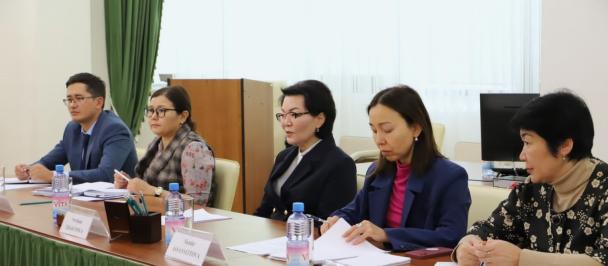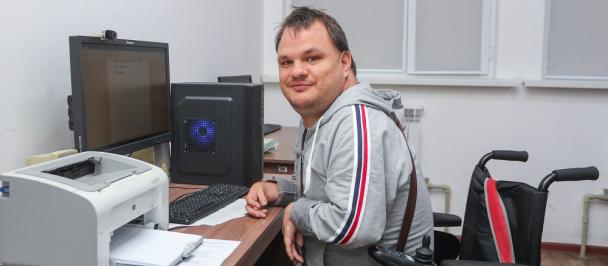Kazakhstan Looks to Europe for Blueprint on Integrating People with Disabilities
September 18, 2023

Job fair for people with disabilities, Astana, April 2022
The social integration of people with disabilities was the theme of a Kazakh delegation visit to Germany and the Netherland to study the experience of these countries. The visit, which was led by members of the Mäjilis, or lower house of Parliament, was made possible thanks to United Nations Development Programme (UNDP) support.
"The primary objective of our trip is to study best practices in the social integration for people with disabilities. This includes providing them with assistive devices, specialized transport, rehabilitation services and funding for long-term care,"said Gaukhar Kalmakova, Deputy Director of the Department of Social Services of the Ministry of Labour and Social Protection of the Population of the Republic of Kazakhstan.
Apart from MPs, the delegation included representatives from the Ministry of Labour and Social Protection of the Population, the Research and Practical Centre for Social Rehabilitation Development and civil society.
During the visit, meetings were held with representatives from the following institutions: the Ministry of Labour, Health and Social Affairs of North Rhine-Westphalia (Germany), the Ministry of Social Affairs and Employment of the Netherlands, a division of the German Pension Insurance Fund, the Health/Care Insurance Fund and the Federal Employment Agency.
Apart from MPs, the delegation included representatives from the Ministry of Labour and Social Protection of the Population, the Research and Practical Centre for Social Rehabilitation Development and civil society.
During the visit, meetings were held with representatives from the following institutions: the Ministry of Labour, Health and Social Affairs of North Rhine-Westphalia (Germany), the Ministry of Social Affairs and Employment of the Netherlands, a division of the German Pension Insurance Fund, the Health/Care Insurance Fund and the Federal Employment Agency.
Germany and the Netherlands – a rich source of knowledge on disability care
In Germany, there are 10.2 million residents with health-related disabilities (12.1 percent of the population), of which 7.8 million are severely disabled. In the Netherlands, around 2 million people have disabilities (11 percent of the population).
Unlike Kazakhstan, the service sector for the rehabilitation and integration of people with disabilities in Germany and the Netherlands is decentralized and based on an insurance system. The policy of these countries focuses on preventing disability, eliminating or reducing the consequences of diseases and effective rehabilitation with the aim of reintegrating individuals into the labour market as fully as possible. Priority is given first to disability prevention services, then to services that support the integration of people with disabilities and, finally, to pension payments.
The key principles of social and vocational rehabilitation in these countries include an individualized approach to each person with a disability, the comprehensiveness of the services provided and the involvement of people with health-related disabilities in the rehabilitation process.
Witnessing the broad spectrum of rehabilitation services first-hand
During the trip, the delegation visited several organizations engaged in the social and professional rehabilitation of people with disabilities in Germany and the Netherlands, including the following ones:
A centre in Dortmund (Germany), which offers professional rehabilitation services for adults with health-related disabilities. The centre provides a diverse range of services, from consultations to assessments of the rehabilitation potential, training, qualification, and the integration of people with disabilities into the labour market.
MediClin Fachk, a medical rehabilitation centre specializing in interdisciplinary treatment and rehabilitation for patients with multiple diseases (Germany).
Buurtzorg Nederland, a company providing long-term care for patients, people with disabilities and the elderly at home.
Heliomare in Wijk aan Zee (Netherlands), a comprehensive rehabilitation centre specializing in medical and sports rehabilitation for people with brain injuries and their successful integration into society.
During the visit, delegates also attended the international rehabilitation and care exhibition in Düsseldorf, where over 700 participants from 37 countries presented their innovations, ranging from individual assistive devices and adaptations to barrier-free construction and mobility at home. Achievements in digitization and robotics, showing the significant potential for effective rehabilitation and care, were also presented.
Germany and the Netherlands employ advanced technologies and approaches in the rehabilitation and integration of people with disabilities. These approaches can also be applied in Kazakhstan.
Delegation takes home a plethora of lessons learned to help disabled in Kazakhstan
According to the Ministry of Labour and Social Protection of the Population, over 719,000 people with disabilities live in the country, of which 422,500 are of working age. Issues of social integration, provision of special social services and employment continue to be relevant in the country's development agenda.
In Kazakhstan's social protection system, 34 rehabilitation centers operate annually, serving people with first and second group disabilities. Besides low coverage, there are issues with a lack of qualified specialists in the field of rehabilitation, such as occupational therapists and physiotherapists, inequality in access to these services within the country, and the remoteness of rehabilitation services from the residence of people with disabilities. Unified approaches and a methodology for a comprehensive system of rehabilitation and habilitation are lacking.
Overall, the existing system of rehabilitation for people with disabilities in the country is not comprehensive and does not always meet the population's demands for quality rehabilitation services.
UNDP support on several fronts
Kazakhstan ratified the Convention on the Rights of Persons with Disabilities in 2015. In May 2023, the Optional Protocol to the Convention on the Rights of Persons with Disabilities was ratified. With the support of UNDP, work has been undertaken to develop and implement measures of the National Plan to ensure the rights and improve the quality of life of persons with disabilities. A Portal of Social Services has also been developed and implemented.
By the end of 2023, the Ministry will receive an analysis of the development of the system of social and professional rehabilitation, focusing on the activities of rehabilitation centres in the social protection system and on the recommendations for amending current legislation and the Rehabilitation Protocol for use by rehabilitation centre specialists.
Also, in the rehabilitation centres of the Kyzylorda and Pavlodar regions, UNDP has implemented a project to create a model apartment for persons using wheelchairs. In the cities of Aktobe and Taraz, a pilot project is underway to create training apartments using technologies of independent supported living, aimed at addressing the deinstitutionalization of residential institutions.
Currently, UNDP, in partnership with the Ministry of Labour and Social Protection of the Population, is implementing a joint initiative on social protection for vulnerable population groups, within which work is being carried out to further improve the national social policy.

 Locations
Locations



